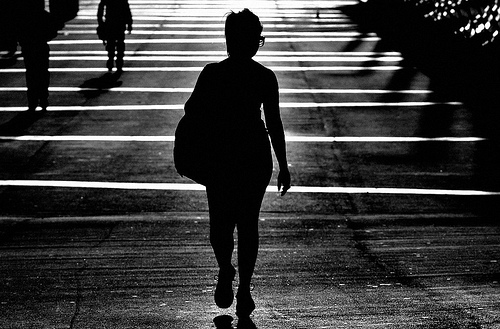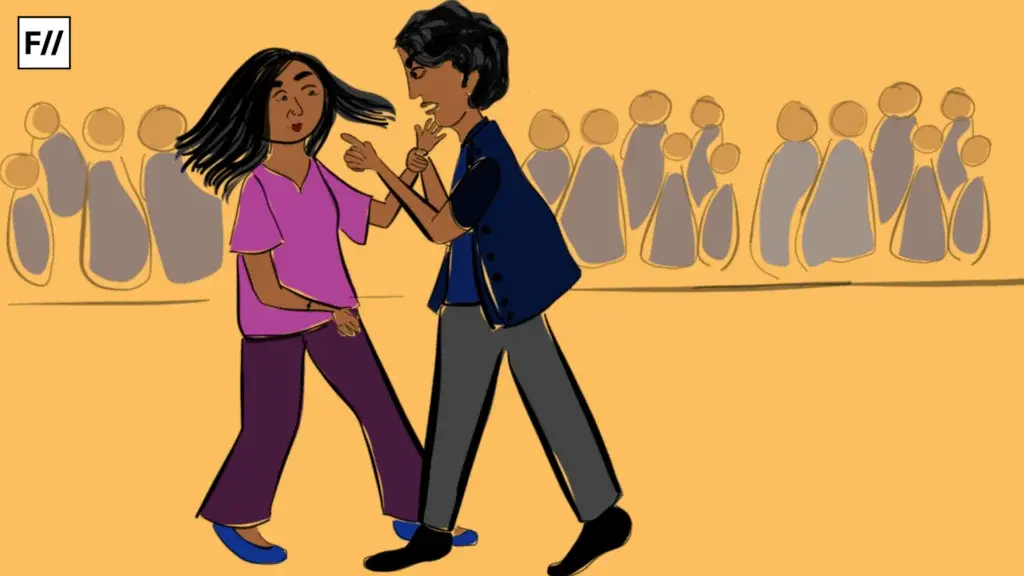This incident report being published partly in the interest of documentation, and partly to report on the state of women’s safety, their right to mobility, travel, work, and to make up part of the public sphere, and generally their right to participatory citizenship in Uttar Pradesh, in small towns through India, and in this part of the world.
Anita, Kalyani, Nishi are permanent employees of a Delhi-based non-governmental women’s organisation that engages in advocacy, runs adult women literacy and empowerment programs (for which they conduct teacher training and sensitization programmes in rural, semi-urban, and urban centres), evaluates governmental/ institutional policy and implementation, and produces research and analyses based on field-work and on existing data, to campaign for greater awareness around gender/ sexual identities. Sana is a consultant in the same organisation, working with the literacy team on audiovisual documentation and materials for curricula, workshops, and other outputs.
They have been working in Pratapgarh district in UP for over 9 years and regularly visit the villages for field work. For the last 5 years they have been staying at Shashank hotel near the railway station.
All four were in Pratapgarh to conduct training at the Umar Vaishya Dharmashala, Chilbila, from 3 through 7 September 2019. They had checked into the Shashank Hotel at around 6 am on Tuesday the 3rd, and were scheduled to depart by train at around 5 pm on Saturday the 7th. They had initially been allotted rooms 104 and 204, but after Nishi returned to Delhi on the 5th, Sana moved to room 106 so she would be closer to Anita and Kalyani in 104. The women were in Pratapgarh on invitation from and in partnership with the Gram Vikas Seva Sansthan (GVSS); their primary point of contact was Amod ji. They were at work between 9-9:30 am and 7-7:30 pm every day while in Pratapgarh, so while they walked about to stretch their legs on occasion, they had neither the time nor the energy to do much more than commute between the dharmshala and the hotel.
At 12:10 am between the night of the 5th and the morning of the 6th, someone began hammering at Sana’s door. The voice on the other side of the door was male, loud, and rude.
At 12:10 am between the night of the 5th and the morning of the 6th, someone began hammering at Sana’s door. The voice on the other side of the door was male, loud, and rude. He insisted she open the door immediately, and claimed he was a policeman. Sana could hear that he was accompanied by a group of several men. Sana has never been to Pratapgarh before and knows no one there, and while she has been a well-informed, well-travelled, intrepid journalist for several years, a group of men beating her door, shouting at her to open her hotel room in the middle of the night, did not inspire her with the confidence to comply. Sana refused. She asked for the hotel manager or for her co-workers, stating that she could not open the door because it was a safety issue. The policeman answered, “Tumhari safety tumse nahi hoti, mujhse hoti hai. Darwaza toh kholna hi padega.” (Your safety doesn’t depend on you, it depends on me. One way or another, you will have to open this door.)
The men at her door kept shouting aggressively and banged the door for a full 10 minutes. Finally, after the men had done the same in room 104, Anita came out from her room and asked Sana to open the door. The moment the door opened, all the police officers barged into the room, pushed Sana aside and started ‘checking’ the washroom and rummaging around the room. They did not ask for permission to enter or to look around; they did not explain why they were doing any of this. This brazen behavior disturbed and distressed Anita, who asked them to stop shouting and speak gently at the very least, even as they continued to search the room.
One of policemen (Arjun SIngh) said that “Police ki awaaz tez hi hoti hai! (This is the voice of the police – the voice of the police IS loud!) Chup raho! (Shut up!) “
Anita, Kalyani, and Sana were all very scared by the policemen’s intimidation, the inexplicable search, and unapologetic shouting. One police officer was unabashedly taking photographs; the group was in Sana’s room till 1 am unaccompanied by any woman constable. When Kalyani gathered herself together enough to call them out on this malpractice, the contingent retreated, all the while ‘threatening’ to return with a mahila (women) police officer.
The next morning another of the officers (Arun Singh) visited the hotel on request from the hotel owner, met Anita and Kalyani, and justified this atrocious behavior in the name of safety drill before the scheduled arrival of Chief Minister the next day.
One police officer was unabashedly taking photographs; the group was in Sana’s room till 1 am unaccompanied by any woman constable. When Kalyani gathered herself together enough to call them out on this malpractice, the contingent retreated, all the while ‘threatening’ to return with a mahila (women) police officer.
He showed Anita and Kalyani a WhatsApp group the police team as well as the SP were on, onto which group photos of the women’s room had been uploaded. The SP had been responding regularly on the group, indicating his satisfaction with the proceedings. Policeman also showed Anita and Kalyani a photo of the entry register, that evidenced someone named Sadiq, who hailed from Pratapgarh itself, had checked into Sana’s room before her. Kalyani pointed out that the photo also showed this person had checked out six hours before Sana checked in. Arun Singh had clearly failed to look at the ‘check out’ column. He said there had clearly been a misunderstanding, a miscommunication. Anita said, humaari galti nahin thi (not on our part). Agar main aap-par uss tarah chillati jiss tarah aap mujh-par chillah rahe the, aapne mujhe thhapadd maar diya hota. (If I had been shouting at you the way you shouted at me you would have slapped me.)
What would your voice be like, if you had been up since 3 am the previous day? asked Arun Singh. Yeh sab aapki suraksha ke liye his kiya ja raha thaa (All this was being done for your safety), he insisted.
Par humne to apne aap ko surakshit nahin mehsoos kiya (But we did not feel safe), said Kalyani.
Aapki pareshaani kya hai? (What’s your problem?) asked Arun Singh. Kucchh hua to nahin, na? (Nothing happened, did it?)
He reiterated the previous night’s indecency had been necessary to secure the safety of the Chief Minister of Uttar Pradesh and left the hotel.
Also read: On Najeeb’s Protest And Police Brutality: Protector or Violator?
The hotel manager, as well as Amod at GVSS both offered to facilitate a meeting of the team with the Superintendant of the police, but also suggested that the women dismiss this matter from their minds. They were both unable to facilitate this meeting. The team had been advised by senior colleagues at Nirantar to submit a formal letter of complaint to the SP as soon as possible, so they wrote one up on Sep. 7 and took it to the police station. Everyone was busy, they were told, with ensuring the safety of the Chief Minister. They were sent to the Samasya Kaksh (Help Centre), where Bindra Chand Pande invited them in with, Aao bitiya (Come in, child).
Anita detailed what had happened, and requested that he receive their written complaint. Bindra Chand Pande told them they should have come to the station immediately, offered to take the letter anyway, but refused to give them any acknowledgement or receipt. Two other men in plainclothes came by, heard the story again, and refused to take the letter at all. They directed the women to the SP’s residence.
The roads approaching the SP’s residence were blocked to traffic, and the women needed to walk to the place. Once there, they were directed to an open area where several officers were congregated, heard out, and told that Yogi Adityanath’s helicopter was about to land there, so they needed to leave. All the police officers they met refused to take the letter and forward it to the SP. They were directed on to a kaptaan sahib (Captain sahib), to be found outside the residence. Two men, who identified themselves as district magistrates, were in attendance along with other police officers. All the men refused to entertain the women’s complaint.
Arre, aaj nahin ho sakti complaint register; kal aana (You can’t register a complaint today; come tomorrow.)
Anita and Kalyani told them they had a train booking for that evening.
That’s not our problem, it’s yours (Woh humari samasya nahin hain, aapki hai).
Sir, aapke zile mein hain to humari suraksha ki zimmedaari kiski hai? (Sir, while we are in your district, whose responsibility is it to ensure our safety?), asked Anita.
Hum-me aapki suraksha ki chinta nahin hai; jo VIP aa rahe hain, unki suraksha ki chinta hai (We are not concerned with your safety; we are concerned with the safety of the VIPs about to arrive here.)
Who is the Chief Minister for? What is the point of beti padhao if your daughters cannot travel for work and stay in a hotel without fear of molestation and harassment through the night? Will you respond in the same way when it is a woman you know, whose door is being beaten at one in the morning?
Anita and Kalyani posed these questions repeatedly – to the police officers, to the magistrates, to the hotel owner. They were stonewalled at every turn. They returned to Delhi without having been able to submit a single-page letter of complaint to anyone in Pratapgarh police.
The next night, back at home, Anita was able (after four hours of phone calls) to get through to the SP for a three-minute conversation. She told him what had happened.
Darwaaza khulega nahin to peeta to jayega hi (If the door is not opened it will be beaten in, naturally), said the Superintendent of Police.
Kya samasya hai – paise to nahin liye na? (What’s your problem? They didn’t ask you for money, after all…)
Also read: JNU Student Rape Case: Delhi Police Fails Women Again
Not one official, representative of government, or self-identified guardian of women’s welfare, had any substantive sympathy or concrete help to offer Anita, Kalyani, and Sana. What they received was dismissal at every turn, a concerted defense of the police’s indefensible behavior, and an admonition to stop complaining. The question we are left with is – is this the best we can do in this country of working women?
Anita has been working on the Adult Women’s Literacy programme at Nirantar for eight years. She helps conduct programme trainings, does planning work and provides logistical support. She also conducts field visits and does documentation work across the country. She has lived alone and worked in several cities, traveled alone extensively, and is deeply engaged with women for whom these are not luxuries, but necessity.
Urvashi is a Deputy Editor at Nirantar, does research work, conducts interviews, and writes. She has lived alone and worked in several cities, traveled alone extensively, and is deeply engaged with women for whom these are not luxuries, but necessity.
Nirantar has been actively involved with the women’s movement and other democratic rights movements since its inception in 1993. We engage in advocacy and community-level work to facilitate participation by young people and adults in formal as well as non-formal learning processes – particularly people with social obstacles to access. Our agenda include seeing and shaping education critically, from an intersectional feminist perspective, and promoting transformatory learning that enables girls and women from marginalised communities to better understand and address their realities.
Featured Image Source: iangel




